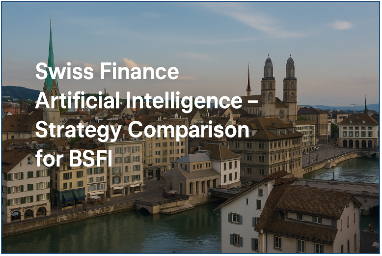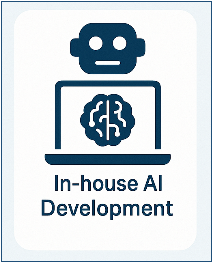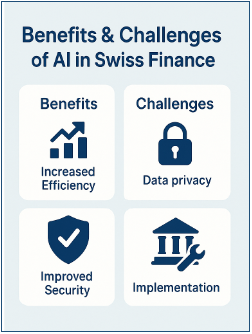Swiss Finance Artificial Intelligence – Strategy Comparison for BSFI
The Rise of Artificial Intelligence in Swiss Finance
The financial services landscape in Switzerland is undergoing a significant transformation thanks to the growing role of Swiss finance artificial intelligence in shaping innovation and competitiveness. From traditional banks to emerging insurtech firms, AI is becoming a strategic pillar in the digital transformation of the Swiss finance sector. The adoption of AI technologies is not merely a trend; it is a necessity for financial institutions aiming to remain competitive in a rapidly evolving market.
Unique challenges such as strict regulations, high demand for transparency, and trust are prevalent in Switzerland, making the choice of the right AI implementation strategy crucial for success. As the financial sector grapples with these challenges, understanding the various AI strategies available can help institutions make informed decisions that align with their operational goals and regulatory requirements.

Top 3 AI Implementation Strategies in Swiss Finance
1. In-house AI Development
Large Swiss banks such as UBS and Credit Suisse often prefer in-house AI development due to the full control it offers. Building internal systems allows them to tailor AI solutions precisely to their operational and regulatory needs. This approach also keeps sensitive data within the organization, ensuring a higher level of data security and reducing the risk of breaches. Additionally, institutions can design AI systems that align closely with their strategic priorities, maximizing long-term value and differentiation.
However, in-house development requires significant resources. The associated costs for system design, infrastructure, and ongoing maintenance are considerable, making this approach difficult for smaller players. There’s also the challenge of sourcing and retaining AI talent. Developing internal expertise takes time and investment, both of which can delay project rollouts and reduce the short-term benefits of AI adoption.
For institutions deeply rooted in the Swiss regulatory framework, building Swiss finance artificial intelligence solutions in-house can also boost national competitiveness.


2. Partnership with AI Technology Providers
As a cost-efficient method, AIaaS fits well within the expanding ecosystem of Swiss finance artificial intelligence, particularly for startups and niche players. This approach is also becoming popular as part of broader Swiss finance artificial intelligence strategies that balance innovation with compliance. For mid-sized institutions seeking flexibility, forming partnerships with AI technology providers can be an effective strategy. These collaborations allow financial firms to tap into the specialized expertise of external vendors, accelerating AI deployment without the burden of building systems from scratch. In many cases, this model is more cost-efficient, as it eliminates the need for extensive in-house development. Institutions also benefit from access to the latest innovations and tools that providers continuously refine and update.
Nevertheless, integrating external AI solutions with existing infrastructure can present technical challenges. Data compatibility, security, and workflow alignment require careful coordination. There’s also the issue of data governance—financial institutions must ensure that third-party providers comply with strict Swiss data privacy and security regulations.
3. AI-as-a-Service (AIaaS) Platforms
Fintech startups and smaller financial institutions often turn to AI-as-a-Service platforms to gain access to sophisticated AI tools without significant upfront investment. These platforms offer a scalable and flexible solution, enabling organizations to pay based on usage, which helps reduce financial risk. AIaaS solutions are typically designed for quick integration, allowing businesses to implement AI with minimal operational disruption.
However, relying on third-party platforms also comes with limitations. Institutions have less control over the technology and must depend on the vendor for system updates, support, and improvements. This dependency can pose challenges if the vendor’s services fail to meet expectations or if there’s a need to switch providers. Furthermore, regulatory scrutiny may increase, as institutions using AIaaS must ensure compliance with Swiss regulations such as those issued by FINMA.
-Platforms.png)
Strategy Comparison: Pros, Cons, and Best Fit
AI Strategy |
Pros |
Challenges |
Best Fit For |
|---|---|---|---|
| In-house Development | Full control, built-in compliance, long-term ROI | High cost, need for internal expertise, longer timeline | Large Swiss banks, insurers |
| Tech Partnership | Balanced cost, expertise access, scalable | Integration issues, data governance risks | Mid-sized financial institutions |
| AI-as-a-Service | Fast deployment, lower upfront investment | Limited control, vendor dependency, regulatory scrutiny | Fintechs, asset & wealth managers |
AI in Action: Use Cases in Swiss Finance
Swiss finance artificial intelligence is already transforming the financial ecosystem, offering innovative applications aligned with the industry’s strict regulatory and quality standards. One of the most impactful use cases is real-time fraud detection. AI systems continuously monitor financial transactions, quickly flagging suspicious activity in accordance with Switzerland’s anti-money laundering (AML) regulations. Machine learning models can detect subtle patterns that might indicate fraudulent behavior, helping institutions improve compliance and reduce risk.
Another area of growth is personalized wealth management. Financial firms use AI-powered behavioral analytics to provide bespoke investment strategies tailored to individual clients’ preferences and risk profiles. This level of personalization is especially important in Swiss private banking, where clients expect highly customized service.

AI is also advancing credit scoring and risk analysis. By analyzing alternative data sources and employing predictive modeling, financial institutions can gain deeper insights into borrower behavior. This enables more accurate risk assessments and supports informed lending decisions.
Process automation through AI and Robotic Process Automation (RPA) is helping firms streamline labor-intensive tasks such as document verification and Know Your Customer (KYC) checks. This increases operational efficiency while ensuring compliance with regulatory requirements.
Given Switzerland’s multilingual population, AI chatbots capable of communicating in German, French, Italian, and English are enhancing customer service. These chatbots provide timely responses to client inquiries, improving satisfaction and engagement while reducing pressure on human support teams.
IMT Solutions: Proven AI Expertise Across Finance Sectors
IMT Solutions has successfully delivered impactful AI implementations for financial institutions, showcasing its capabilities in building scalable and effective AI systems. The company’s expertise is evident in its ability to address the unique challenges faced by the financial sector.
Case Study 1: Streamlining Insurance Claims with AI
Client: Leading insurance company in Vietnam.
Challenge: Manual claims verification led to processing delays and client dissatisfaction.
Solution: IMT implemented a smart benefit verification tool integrated with legacy systems, reducing verification time from 30 minutes to just 3.
Results:
- Achieved 100% data extraction accuracy.
- Reduced claim errors by 50%.
- Realized 40% cost savings through 90% automation, significantly enhancing operational efficiency.
Case Study 2: Real-Time Sentiment Analysis in Banking
Client: Major retail bank in Vietnam.
Challenge: The bank needed real-time voice analytics to enhance customer support.
Solution: IMT deployed an AI Call Analyzer using large language models (LLMs) to deliver instant insights and actionable sentiment reports.
Results:
- Achieved a 40% reduction in monitoring costs.
- Experienced a 30% drop in customer complaints.
- Enhanced post-call reviews with frustration and confusion detection, leading to improved customer service.
Benefits & Challenges of AI in Swiss Finance
Swiss financial institutions are experiencing significant advantages from AI adoption, alongside a set of complex challenges that must be carefully managed.
Among the most notable benefits is operational efficiency. AI automates routine processes such as document handling, compliance reporting, and transaction monitoring. This streamlining of workflows results in faster execution, reduced human error, and lower costs. Additionally, AI contributes to data-driven decision-making. Institutions can use AI to model economic scenarios, forecast market trends, and improve credit assessments, resulting in more informed and strategic business decisions.
AI also enhances personalized financial services. Whether serving high-net-worth individuals, SMEs, or retail clients, AI allows for hyper-personalized engagement that deepens customer relationships and improves satisfaction.

On the other hand, Swiss finance faces a shortage of AI talent. There’s a limited pool of professionals with the technical expertise and regulatory understanding required to implement machine learning solutions responsibly. The regulatory environment itself poses another hurdle, as institutions must comply with strict FINMA and GDPR requirements. Transparency, auditability, and data protection are essential for AI systems operating in this space.
Trust is another core issue. Swiss clients expect transparency and ethical handling of their data. To meet this expectation, firms must invest in explainable AI (XAI) and make efforts to mitigate algorithmic bias, ensuring that their AI systems maintain credibility and fairness. These benefits reflect the growing maturity of Swiss finance artificial intelligence across both traditional and digital institutions.
Strategic Outlook: Partnering with AI Experts Like IMT
As Swiss finance artificial intelligence continues to evolve, strategic partnerships will play a vital role in successful implementation. Given these challenges, many forward-looking financial institutions are choosing to collaborate with experienced AI solution providers like IMT Solutions. IMT combines technical expertise with industry-specific knowledge to help businesses:
- Accelerate time-to-market with AI-driven services.
- Ensure data security and compliance readiness.
- Free internal teams to focus on high-impact, strategic work.
With proven success in automating claims for insurers and deploying AI-powered call analytics in banking, IMT continues to be a trusted partner for organizations that want to innovate without compromising on compliance or quality.





